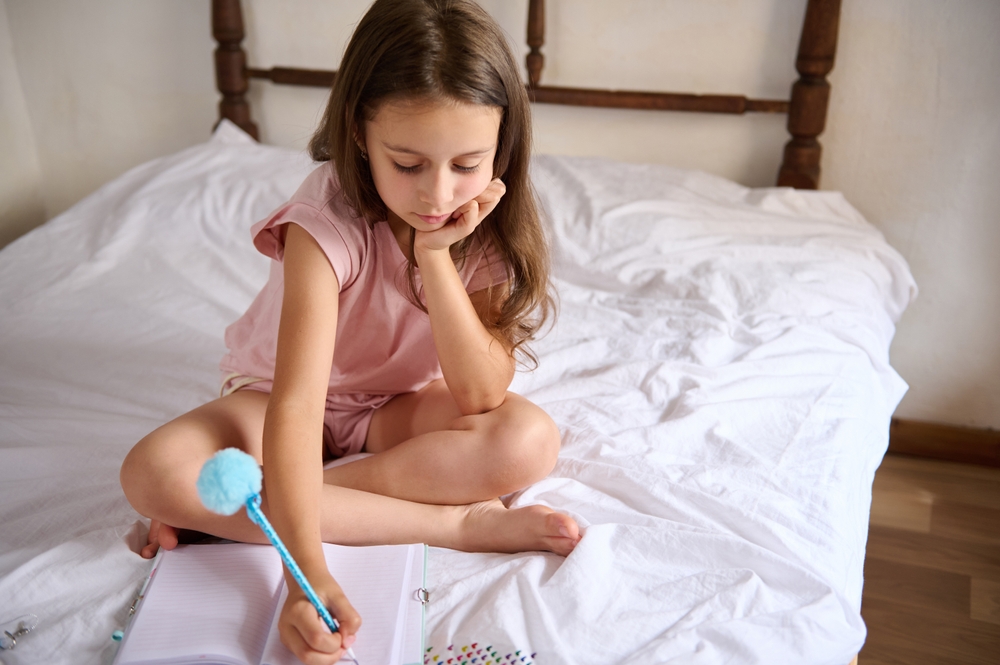For many children, putting thoughts into words isn’t always easy—especially when emotions run high or they’re working through something they don’t fully understand. That’s where journaling comes in. This simple and flexible practice can help kids express themselves, process feelings, and explore their thoughts in a safe and personal space.
Journaling isn’t just for older children or those with a love of writing. Even young kids can benefit from keeping a journal with drawings, scribbles, or guided prompts. With regular encouragement and the right tools, journaling can become a powerful part of your child’s emotional development.
A Safe Outlet for Emotions
Children experience a wide range of emotions—frustration, joy, fear, excitement, confusion—but they don’t always have the vocabulary or confidence to talk about them out loud. Journaling offers a private and judgment-free way for kids to get those feelings out, which can help prevent emotional bottlenecks or outbursts.
By putting their thoughts on paper, children can:
- Process experiences more clearly
- Identify patterns in their feelings
- Begin to understand what triggers different emotions
Sometimes writing about a problem makes it feel more manageable. For kids who are shy or easily overwhelmed, journaling can be an especially helpful tool for emotional processing and release.
Builds Self-Awareness and Reflection
Journaling helps children slow down and take a closer look at what they’re thinking and feeling. Over time, this encourages a greater sense of self-awareness and emotional intelligence.
Through regular journaling, kids may begin to notice:
- How their mood changes day to day
- What activities or people make them feel good
- How they respond to challenges and stress
These are powerful insights that support healthier coping skills, better decision-making, and stronger relationships with others.
Encourages Language and Communication Skills
Whether your child is writing a sentence, drawing a picture, or responding to a journal prompt, journaling supports literacy and communication development. It gives kids the chance to organize their thoughts, experiment with vocabulary, and tell their own stories.
Even if your child isn’t yet writing independently, they can dictate their thoughts to you or use drawings and symbols to share what’s on their mind. Journaling doesn’t have to be grammatically perfect or polished—it just needs to reflect the child’s voice.
And for those who enjoy storytelling or creative writing, a journal can also be a place to explore imaginary worlds, characters, and ideas.
Builds Confidence and Self-Esteem
A journal can become a personal archive of a child’s growth, challenges, and accomplishments. Looking back through past entries reminds them of how far they’ve come and helps reinforce a sense of pride in their progress.
When children take ownership of their journal, they begin to:
- Trust their own thoughts and ideas
- Value their emotions as valid and important
- Feel empowered to speak up or express themselves in other ways
Even when the day has been tough, journaling offers a quiet reminder that every emotion has a place and every voice deserves to be heard.
Journaling Ideas to Get Started
Not every child will naturally take to journaling without a little encouragement, and that’s okay. Journaling can take many forms depending on age, interests, and personality. Here are a few ideas to get your child started:
1. Feelings Journal
Have your child draw or write about how they feel at the end of the day. A feelings chart with faces or emojis can help younger children identify emotions more easily.
2. Gratitude Journal
Encourage your child to list or draw three things they’re grateful for each day. This simple habit helps build a positive mindset and appreciation for everyday moments.
3. Prompt-Based Journaling
Offer writing prompts like:
- “What made you smile today?”
- “If you could go anywhere in the world, where would it be?”
- “What do you do when you feel nervous?”
Prompts can be especially helpful for kids who aren’t sure what to write about.
4. Drawing or Art Journals
Some kids express themselves better through art than words. Let them illustrate their day, create comic strips, or draw how they feel inside.
Tips for Parents
Helping your child develop a journaling habit doesn’t have to be complicated. Here are a few ways to support them along the way:
- Offer supplies: Let them choose a fun notebook, colored pens, stickers, or anything else that makes it feel personal and exciting.
- Create a routine: Set aside a few minutes each evening or after school as quiet journaling time.
- Respect privacy: Unless your child asks you to read their journal, it’s important to treat it as their own safe space.
- Lead by example: If you keep a journal yourself, your child may be more likely to follow your lead.
they’re sorting through their feelings, telling a story, or writing about their day, journaling nurtures emotional growth, builds communication skills, and fosters resilience.
Best of all, it’s a tool they can carry with them for life. By encouraging journaling now, you’re helping your child develop a healthy, creative outlet they can return to again and again—whenever they need clarity, comfort, or a quiet moment to check in with themselves.
Let’s Grow Pediatrics Is Your Pediatric Physical Therapy Provider
At Let’s Grow Pediatrics in Edmond, OK, our pediatric physical therapy programs are designed to cater to the unique needs of each child. We create a supportive and fun environment where children can explore their physical abilities, overcome challenges, and build confidence. Our expert therapists use a range of activities, exercises, and play-based interventions to target specific gross motor skill areas. Whether it’s improving balance, coordination, strength, or mobility, we work closely with children and their families to set achievable goals and track progress. Call us today at 405-562-3485.

